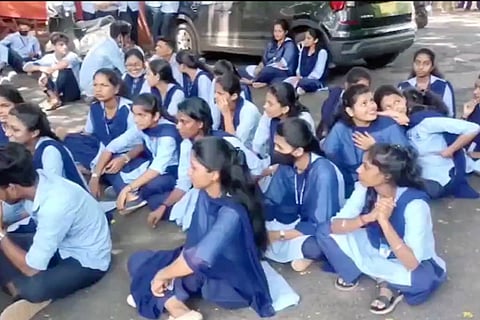

Fifteen students from University College, Mangaluru, were denied permission to attend classes or make use of library facilities wearing the hijab (a headscarf) on Saturday, May 28, following a decision taken in a meeting held by Mangaluru University officials.The meeting was held on Friday, a day after a protest by Hindu students, backed by the Akhila Bharatiya Vidyarthi Parishad (ABVP), asking the university to stop women students from wearing the hijab inside the campus. "We are implementing the government order and High Court order regarding the uniform. We are restricting the wearing of hijab in classrooms, libraries, laboratories," Vice-Chancellor Subramanya Yadapadithaya told TNM after the meeting.
The ABVP-led protest on Thursday came ten days after a decision taken by Mangaluru University to restrict the hijab in the colleges. "In a syndicate (university) meeting on May 16, we decided to strictly implement the High Court's decision and the government order pertaining to uniforms. A notice barring students from wearing the hijab was also put on the college notice board on May 17," the Subramanya Yadapadithaya said. Notably, while the High Court order had banned hijab in classrooms and labs, the University has added libraries to the venues where it is banned.
The decision taken by Mangaluru University applies to seven colleges under its administration. This includes the two constituent colleges: University College, Mangaluru, and Field Marshal K M Cariappa College in Madikeri; as well as five other autonomous colleges in Mangaluru and Belthangady. There are over 200 colleges in coastal Karnataka affiliated to Mangaluru University. However, this decision is not binding to all of those colleges.
Until this month, students were allowed to wear a headscarf of the same colour as the college uniform at University College, the vice chancellor said. "There are 44 Muslim students, and among them, 15 students are insisting that they want to wear the hijab. If there are inconveniences for the students, we will facilitate their transfer to other colleges," he added.
The University College Student Union President, Vinyas V Acharya, who was backed by the ABVP, was forced to resign amid the furore in the college this week. The Student Union members, who elected Vinyas unanimously to the post of president, complained that he was not committed to implementing a ban on wearing the hijab in the campus. Vinyas is an ABVP member and a third year Bachelor of Science student in the college. "ABVP members were unhappy that I was not stricter in the way I approached the principal about implementation of the hijab rule," Vinyas told reporters on Friday.
Though he was in favour of implementing a hijab ban, Vinyas said that he advocated for dialogue to resolve the issue rather than taking to protesting outside the college. "I gave my opinion in the meeting that I am with all our students and I am not against anyone. Since I am a final year BSc student, I know how important our education is, I have been in this course for three-and-a-half years. If our education is affected because of a big protest here, it could cause problems when we are looking for jobs," Vinyas said. The ABVP has been conspicuously absent in saffron shawl protests by Hindu students in Udupi and Dakshina Kannada ever since the controversy over the wearing of the hijab broke out. Instead, other Hindutva organisations like the Hindu Jagarana Vedike and Bajrang Dal have organised students to protest outside their college campuses.
The disquiet at Mangaluru University comes months after protests in Karnataka over the right to wear the hijab in the classroom. In December 2021, when six Muslim girls in Udupi’s Government Pre-University College approached the college management asking for permission to wear the hijab in the classroom. The stand-off escalated into a political and legal fight. Students wearing saffron shawls protested outside colleges in Udupi, strong-arming college managements to shut Muslim girls wearing the hijab out of the college. The Karnataka High Court eventually enforced the uniform and restricted the wearing of hijabs in classrooms in March 2022.
TNM had earlier reported that there were over 400 Muslim girls in Udupi contemplating the future of their academics following the High Court decision. Many students are planning to shift to private colleges where the hijab is allowed.
Data provided by the Education Department in Udupi had earlier showed that the number of Muslim girls attending Pre-University colleges in the district doubled between 2005 and 2021. Education experts now fear that the ban on wearing the hijab could reverse this trend.